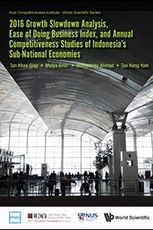
2016 Growth Slowdown Analysis, Ease of Doing Business Index, and Annual Competitiveness Studies of Indonesia’s Sub-National Economies
Authors : Khee Giap Tan (Lee Kuan Yew School of Public Policy, NUS, Singapore), Mulya Amri (Lee Kuan Yew School of Public Policy, NUS, Singapore), Nursyahida Ahmad (Lee Kuan Yew School of Public Policy, NUS, Singapore), Kong Yam Tan (Lee Kuan Yew School of Public Policy, NUS, Singapore)
Publisher : World Scientific
ISBN : 978-981-3226-87-6
"The ACI survey provides critical policy insights on competitiveness to lay the groundwork for governments to frame and improve their competitiveness policies, and provides guidance for business-seeking entities to enter the market."
-- Dr Darmin Nasution
Coordinating Minister for Economic Affairs, Republic of Indonesia
"As I have mentioned several times, this research is very important for Indonesia ... I recommend that this research result be disseminated to all Indonesian bureaucrats of the central government as well as the provincial level."
-- Prof. Dr Kuntoro Mangkusubroto
School of Business and Management, Bandung Institute of Technology, Indonesia
-- Dr Darmin Nasution
Coordinating Minister for Economic Affairs, Republic of Indonesia
"As I have mentioned several times, this research is very important for Indonesia ... I recommend that this research result be disseminated to all Indonesian bureaucrats of the central government as well as the provincial level."
-- Prof. Dr Kuntoro Mangkusubroto
School of Business and Management, Bandung Institute of Technology, Indonesia
This book is an update of the annual flagship study by the Asia Competitiveness Institute at the Lee Kuan Yew School of Public Policy, National University of Singapore, that dissects Indonesia's sub-national competitiveness at both the provincial level (covering 34 provinces) and the regional level (covering six major island groups). Based on a rich dataset of 100 indicators, the study covers four environments of competitiveness: (1) Macroeconomic Stability, (2) Government and Institutional Setting, (3) Financial, Businesses, and Manpower Conditions, and (4) Quality of Life and Infrastructure Development. It also presents each province and region's comparative strengths and weaknesses, and conducts "what-if" policy simulations to propose policy suggestions.
Aside from exploring competitiveness, the book also features empirical research on the determinants of growth slowdown in Indonesian provinces and its impact on policy implications. It also features the inaugural Ease of Doing Business Index on Attractiveness to Investors, Business Friendliness and Competitive Policies (EDB Index ABC) for Indonesian provinces. Coupled with practical insights and policy implications, this book is a recommended read for policymakers, researchers, and the general audience interested in Indonesia's economic development.
Aside from exploring competitiveness, the book also features empirical research on the determinants of growth slowdown in Indonesian provinces and its impact on policy implications. It also features the inaugural Ease of Doing Business Index on Attractiveness to Investors, Business Friendliness and Competitive Policies (EDB Index ABC) for Indonesian provinces. Coupled with practical insights and policy implications, this book is a recommended read for policymakers, researchers, and the general audience interested in Indonesia's economic development.
Tan Khee Giap is a Co-Director of the Asia Competitiveness Institute (ACI) and Associate Professor at the Lee Kuan Yew School of Public Policy, National University of Singapore. He is also the Chairman of the Singapore National Committee for Pacific Economic Cooperation. Upon graduating with a PhD from University of East Anglia, England, in 1987 under the Overseas Research Scheme awarded by the Committee of Vice-Chancellors and Principals of the Universities of the United Kingdom, he joined the banking sector as a treasury manager and served as secretary to the Assets and Liabilities Committee for three years, thereafter he taught at the Department of Economics and Statistics, National University of Singapore, 1990–1993. Dr Tan joined Nanyang Technological University in 1993 and was Associate Dean, Graduate Studies Office, 2007–2009. He is now with Lee Kuan Yew School of Public Policy, National University of Singapore.
Dr Tan has consulted extensively with the various government ministries, statutory boards and government-linked companies of the Singapore government including Ministry of Finance, Ministry of Trade & Industry, Ministry of Manpower, Housing & Development Board, Civil Aviation Authority of Singapore, Singapore Tourism Board, Trade Development Board, Maritime Port Authority, Ministry of Information, Culture & Arts, Economic Development Board, Ministry of National Development, Media Development Authority, Ministry of Environment and Water Resources, Singapore Design Council, Ministry of Community Development, Youth & Sports, Singapore Press Holdings, Mendaki, StarHub, CapitaLand and Great Eastern Life on policies concerning financial, fiscal, trade, tourism, public housing, labour, telecommunication, tourism, liveable cities, creative industry, media, community development, airport and seaport activities. He has also served as a consultant to international agencies such as the Asian Development Bank, Asian Development Bank Institute, United Nations Industrial Development Group, World Gold Council, ASEAN Secretariat, Central Policy Unit of Hong Kong, Kerzner International, Las Vegas Sands and Marina Bay Sands.
Dr Tan is the lead author for 27 books, serving as journals editor and published widely in international refereed journals. His current research interests include econometric forecasting, Cost of Living Index, Global Liveable Cities Index and competitiveness analysis on 31 provinces in China, 35 states in India and ASEAN-10 economies.
Dr Tan was Deputy President of the Singapore Economic Society, 2004. He served in the 2002 Economic Review Committee (ERC). He has also served as Chairman of the Task Force on Portable Medical Benefits (PMB), as the Deputy Chairman of the IPS Forum for Economic Restructuring (IFER) in 2003 and as a member of the Resource Panel of the Government Parliamentary Committee for Transport, Government Parliamentary Committee for Finance and Trade & Industry and Government Parliamentary Committee for Defence and Foreign Affairs since 2007.
Dr Tan has extensively advised and guided multinational corporations leading to public listings especially those companies from Mainland China and Taiwan. He is also currently an Independent Director of the publicly listed BreadTalk Group, Boustead Projects, TEE Land and Chengdu Rural Commercial Bank.
Mulya Amri is a Research Fellow and Deputy Director (Research) at the Asia Competitiveness Institute (ACI), Lee Kuan Yew School of Public Policy (LKYSPP), National University of Singapore (NUS). He has held a key role in ACI's research on Indonesian sub-national competitiveness since 2011, including co-writing three books on the topic, the latest one titled 2014 Annual Competitiveness Analysis and Development Strategies for Indonesian Provinces. He is also closely involved in ACI's research on city liveability and competitiveness, and has written widely on the topic of urban development and city-level governance. Mulya has 15 years of working experience in the private, public, and non-profit sectors. Upon moving to Singapore in 2008, he worked with HOK (a global planning and architecture consultancy firm) on city planning projects throughout Asia, and with Jurong Consultants (the consultancy arm of Singapore's JTC Corporation) on the planning of industrial zones in the Middle East. Prior to that, Mulya worked with international development agencies such as the World Bank, UNDP, and UN-HABITAT on projects related to urban and housing development, local governance, as well as community-driven development in various Indonesian regions. He is also a co-founder and sits on the advisory board of COMBINE Resource Institution, a non-profit organisation based in Yogyakarta, Indonesia. Mulya has a PhD degree in Public Policy from the National University of Singapore. Prior to that, he graduated with a bachelor's degree from Institut Teknologi Bandung, Indonesia, and was awarded the Fulbright scholarship to study for a Master's degree in Urban Planning at the University of California, Los Angeles, and a Chevening award to study at the London School of Economics and Political Science.
Nursyahida Ahmad is a Research Assistant at the Asia Competitiveness Institute (ACI) at the Lee Kuan Yew School of Public Policy (LKYSPP), National University of Singapore (NUS). Nursyahida graduated from Nanyang Technological University in 2015, with a Bachelor of Arts in Economics (second upper). At ACI, Nursyahida is a member of the project on Indonesia's competitiveness analysis at the provincial and regional level. She is also a member of the research project on firm-level productivity, efficiency and competitiveness in the 16 Asian economies. Nursyahida has co-authored two books on provincial development and policy options for Indonesia. Her research interests include development economics and socioeconomic studies.
Tan Kong Yam is presently the Co-Director of the Asia Competitiveness Institute. He is also Professor of Economics at the Nanyang Technological University. From June 2002 to June 2005, he was a senior economist at the World Bank office in Beijing where he worked on issues of macro stabilization, integration of the fragmented domestic market, banking reform, international trade and investment, energy security as well as regional inequality. In 2004, he was a member of the World Bank expert group on the eleventh five-year plan (2006–10) for the State Council in China. The expert group provided analysis and policy recommendations on urbanization, regional inequality, innovation policy, energy and water policy as well as strategy on banking reform to the Chinese government.
Prior to that, he was the chief economist of the Singapore government (1999–2002), and Head, Department of Business Policy, Faculty of Business Administration at the National University of Singapore (NUS). He is a graduate of Princeton (1975–79, class of 1931 scholar, Paul Volcker Thesis prize) and Stanford University (1980–83), where he completed his Master's and PhD in three years. Prior to joining NUS, he worked at the Hoover Institution at Stanford University, World Bank, Monetary Authority of Singapore, and was the Director of Research at the Ministry of Trade and Industry in Singapore.
His research interests are in international trade and finance, economic and business trends in the Asia Pacific region and economic reforms in China. He has published ten books and numerous articles in major international journals including American Economic Review, World Bank Economic Review, Long Range Planning, and Australian Journal of Management among others on economic and business issues in the Asia Pacific region. He served as a board member at the Singapore Central Provident Fund Board (1984–96) and the National Productivity Board (1989–90). He has also consulted for many organizations including Temasek, GIC, Citigroup, IBM, ATT, BP, ABN-AMRO, Ikea, Bank of China, China Construction Bank, People's Bank of China, EDB, Areva, CapitaLand, Guangdong provincial government, Samsung, Mauritius government, Ministry of Trade and Industry, Mobil, Singapore Technology, etc.
Dr Tan has consulted extensively with the various government ministries, statutory boards and government-linked companies of the Singapore government including Ministry of Finance, Ministry of Trade & Industry, Ministry of Manpower, Housing & Development Board, Civil Aviation Authority of Singapore, Singapore Tourism Board, Trade Development Board, Maritime Port Authority, Ministry of Information, Culture & Arts, Economic Development Board, Ministry of National Development, Media Development Authority, Ministry of Environment and Water Resources, Singapore Design Council, Ministry of Community Development, Youth & Sports, Singapore Press Holdings, Mendaki, StarHub, CapitaLand and Great Eastern Life on policies concerning financial, fiscal, trade, tourism, public housing, labour, telecommunication, tourism, liveable cities, creative industry, media, community development, airport and seaport activities. He has also served as a consultant to international agencies such as the Asian Development Bank, Asian Development Bank Institute, United Nations Industrial Development Group, World Gold Council, ASEAN Secretariat, Central Policy Unit of Hong Kong, Kerzner International, Las Vegas Sands and Marina Bay Sands.
Dr Tan is the lead author for 27 books, serving as journals editor and published widely in international refereed journals. His current research interests include econometric forecasting, Cost of Living Index, Global Liveable Cities Index and competitiveness analysis on 31 provinces in China, 35 states in India and ASEAN-10 economies.
Dr Tan was Deputy President of the Singapore Economic Society, 2004. He served in the 2002 Economic Review Committee (ERC). He has also served as Chairman of the Task Force on Portable Medical Benefits (PMB), as the Deputy Chairman of the IPS Forum for Economic Restructuring (IFER) in 2003 and as a member of the Resource Panel of the Government Parliamentary Committee for Transport, Government Parliamentary Committee for Finance and Trade & Industry and Government Parliamentary Committee for Defence and Foreign Affairs since 2007.
Dr Tan has extensively advised and guided multinational corporations leading to public listings especially those companies from Mainland China and Taiwan. He is also currently an Independent Director of the publicly listed BreadTalk Group, Boustead Projects, TEE Land and Chengdu Rural Commercial Bank.
Mulya Amri is a Research Fellow and Deputy Director (Research) at the Asia Competitiveness Institute (ACI), Lee Kuan Yew School of Public Policy (LKYSPP), National University of Singapore (NUS). He has held a key role in ACI's research on Indonesian sub-national competitiveness since 2011, including co-writing three books on the topic, the latest one titled 2014 Annual Competitiveness Analysis and Development Strategies for Indonesian Provinces. He is also closely involved in ACI's research on city liveability and competitiveness, and has written widely on the topic of urban development and city-level governance. Mulya has 15 years of working experience in the private, public, and non-profit sectors. Upon moving to Singapore in 2008, he worked with HOK (a global planning and architecture consultancy firm) on city planning projects throughout Asia, and with Jurong Consultants (the consultancy arm of Singapore's JTC Corporation) on the planning of industrial zones in the Middle East. Prior to that, Mulya worked with international development agencies such as the World Bank, UNDP, and UN-HABITAT on projects related to urban and housing development, local governance, as well as community-driven development in various Indonesian regions. He is also a co-founder and sits on the advisory board of COMBINE Resource Institution, a non-profit organisation based in Yogyakarta, Indonesia. Mulya has a PhD degree in Public Policy from the National University of Singapore. Prior to that, he graduated with a bachelor's degree from Institut Teknologi Bandung, Indonesia, and was awarded the Fulbright scholarship to study for a Master's degree in Urban Planning at the University of California, Los Angeles, and a Chevening award to study at the London School of Economics and Political Science.
Nursyahida Ahmad is a Research Assistant at the Asia Competitiveness Institute (ACI) at the Lee Kuan Yew School of Public Policy (LKYSPP), National University of Singapore (NUS). Nursyahida graduated from Nanyang Technological University in 2015, with a Bachelor of Arts in Economics (second upper). At ACI, Nursyahida is a member of the project on Indonesia's competitiveness analysis at the provincial and regional level. She is also a member of the research project on firm-level productivity, efficiency and competitiveness in the 16 Asian economies. Nursyahida has co-authored two books on provincial development and policy options for Indonesia. Her research interests include development economics and socioeconomic studies.
Tan Kong Yam is presently the Co-Director of the Asia Competitiveness Institute. He is also Professor of Economics at the Nanyang Technological University. From June 2002 to June 2005, he was a senior economist at the World Bank office in Beijing where he worked on issues of macro stabilization, integration of the fragmented domestic market, banking reform, international trade and investment, energy security as well as regional inequality. In 2004, he was a member of the World Bank expert group on the eleventh five-year plan (2006–10) for the State Council in China. The expert group provided analysis and policy recommendations on urbanization, regional inequality, innovation policy, energy and water policy as well as strategy on banking reform to the Chinese government.
Prior to that, he was the chief economist of the Singapore government (1999–2002), and Head, Department of Business Policy, Faculty of Business Administration at the National University of Singapore (NUS). He is a graduate of Princeton (1975–79, class of 1931 scholar, Paul Volcker Thesis prize) and Stanford University (1980–83), where he completed his Master's and PhD in three years. Prior to joining NUS, he worked at the Hoover Institution at Stanford University, World Bank, Monetary Authority of Singapore, and was the Director of Research at the Ministry of Trade and Industry in Singapore.
His research interests are in international trade and finance, economic and business trends in the Asia Pacific region and economic reforms in China. He has published ten books and numerous articles in major international journals including American Economic Review, World Bank Economic Review, Long Range Planning, and Australian Journal of Management among others on economic and business issues in the Asia Pacific region. He served as a board member at the Singapore Central Provident Fund Board (1984–96) and the National Productivity Board (1989–90). He has also consulted for many organizations including Temasek, GIC, Citigroup, IBM, ATT, BP, ABN-AMRO, Ikea, Bank of China, China Construction Bank, People's Bank of China, EDB, Areva, CapitaLand, Guangdong provincial government, Samsung, Mauritius government, Ministry of Trade and Industry, Mobil, Singapore Technology, etc.
"The ACI survey provides critical policy insights on competitiveness to lay the groundwork for governments to frame and improve their competitiveness policies, and provides guidance for business-seeking entities to enter the market."
-- Dr Darmin Nasution
Coordinating Minister for Economic Affairs, Republic of Indonesia
"As I have mentioned several times, this research is very important for Indonesia ... I recommend that this research result be disseminated to all Indonesian bureaucrats of the central government as well as the provincial level."
-- Prof. Dr Kuntoro Mangkusubroto
School of Business and Management, Bandung Institute of Technology, Indonesia
-- Dr Darmin Nasution
Coordinating Minister for Economic Affairs, Republic of Indonesia
"As I have mentioned several times, this research is very important for Indonesia ... I recommend that this research result be disseminated to all Indonesian bureaucrats of the central government as well as the provincial level."
-- Prof. Dr Kuntoro Mangkusubroto
School of Business and Management, Bandung Institute of Technology, Indonesia
Buy this book, http://www.worldscientific.com/worldscibooks/10.1142/10621, 9655, false
FAQs
Click on the "Buy this book" button
You can email us at book-review@enago.com and we will get back to you with the next steps shortly.
New Releases
-

Advances in the Molecular Understanding of Colorectal Cancer
-
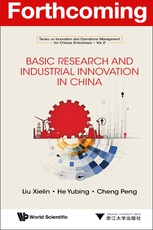
Basic Research and Industrial Innovation in China
-
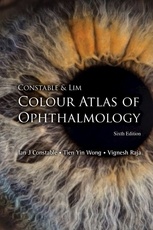
Constable & Lim Colour Atlas Of Ophthalmology: Sixth Edition
-
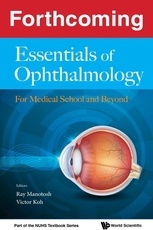
Essentials of Ophthalmology: For Medical School and Beyond
-
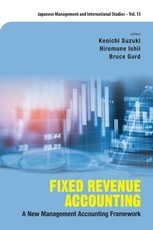
Fixed Revenue Accounting: A New Management Accounting Framework
All featured publishers and authors can avail of a free promotional interview on Enago Academy! Write to us now!
